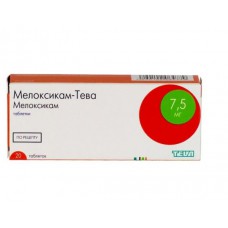Expiration date: 04/2027
Tablets:
Action:
anti-inflammatory, antipyretic, analgesic.
Composition:
meloxicam 7.5 and 15 mg
auxiliary: lactose monohydrate, cellulose microscopic, sodium citrate dihydrate, povidone, crospovidone, silica colloidal anhydrous, magnesium stearate
Indications:
rheumatoid arthritis, osteoarthritis, ankylosing spondylitis and other inflammatory and degenerative diseases of the joints, accompanied by pain syndrome
Injectable:
Pharmacological action
NPVS. Anoliefo acid derivative, a selective COX-2 inhibitor. I believe that is about 100 times more active in inhibiting COX-2 than COX-1, and is superior in this respect to other NSAIDs. Has expressed antiinflammatory, and analgesic effects. The mechanism of action is inhibition of prostaglandin synthesis. Inhibits the synthesis of prostaglandins in inflammation to a greater degree than in the stomach lining or kidneys, due to inhibition predominantly COX-2.
Indications
Symptomatic treatment of rheumatoid arthritis, pain syndrome in osteoarthritis, arthrosis, degenerative diseases of the joints.
Dosage regimen
Daily dose 7.5-15 mg, the maximum daily dose (regardless of dosage form) is 15 mg. in patients with an increased risk of side effects, the initial dose is 7.5 mg/day. In patients with severe renal insufficiency on hemodialysis, the maximum daily dose is 7.5 mg. Rectally applied 1 times/day.
Side effect
Possible nausea, vomiting, abdominal pain, constipation, diarrhea, flatulence, anemia, rash, itching, dizziness, headache, swelling, seldom temporary violations of biochemical indicators of liver function (increased transaminases or bilirubin), regurgitation, erosive and ulcerative lesions of the digestive tract, hidden or obvious gastrointestinal bleeding, changes in blood counts, including the ratio of white blood cells, leukopenia and thrombocytopenia, stomatitis, blisters, tinnitus, drowsiness, increased blood pressure, congestion, palpitations, indicators of kidney function (increased creatinine and/or urea in the blood serum).
Contraindications
Bronchial asthma, polyps of the nasal mucosa, angioedema or urticaria caused by acetylsalicylic acid or other NSAIDs, peptic ulcer in acute phase, severe liver failure in patients not undergoing dialysis, children up to age 15 years, pregnancy, hypersensitivity to meloxicam.
Special instruction
To apply caution in diseases of the upper gastrointestinal tract, and on the background of treatment with anticoagulants.
In the occurrence of peptic ulcers or gastrointestinal bleeding, and the development of adverse reactions in the skin and mucous membranes, meloxicam should be discontinued.
In patients with reduced BCC and reduced the level of renal perfusion, the use of meloxicam can lead to clinically significant renal insufficiency, which is fully reversible after discontinuation of therapy. The risk of developing this complication include patients with signs of dehydration, congestive heart failure, liver cirrhosis, nephrotic syndrome, a clinically severe kidney disease, receiving diuretics, dehydrated patients after major surgical operations. In these patients, early treatment should be carefully monitored daily diuresis and renal function. In rare cases, meloxicam may cause interstitial nephritis, glomerulonephritis, renal medullary necrosis or nephrotic syndrome. With a slight or moderate reduction in kidney function (level of QC over 25 ml/min) dose adjustment is not required.
When a persistent and significant elevation of transaminases and other liver function tests, meloxicam should be withdrawn and to conduct appropriate monitoring tests. In patients with cirrhosis of the liver in a stable clinical condition, reduce the dose of meloxicam is required. Debilitated patients carry worse side effects, so in such cases, a more thorough supervision of a physician.
With careful use of meloxicam in patients of advanced age, which is more likely the deterioration of the kidney, liver and heart.
Meloxicam should not be used with rectal related inflammatory diseases of the rectum and the anal Department, and also rectal or anal bleeding in anamnesis.
With the development of such side effects as dizziness and drowsiness, it is recommended to refrain from driving and other potentially hazardous activities, requiring high speed of psychomotor reactions.
If necessary, use during lactation should decide the issue of termination of breastfeeding.
With simultaneous use of meloxicam with other NSAIDs increases the risk of ulcers and gastrointestinal bleeding, with anticoagulants - increased risk of bleeding with methotrexate - increased myelodepressive action with diuretics - increased risk of renal disease with cyclosporine - increased nephrotoxicity.





